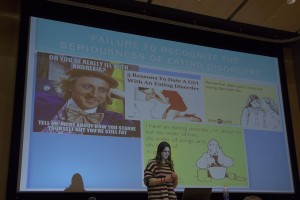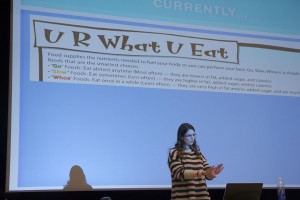[soundcloud id=’193110065′]
By Alyssa Davanzo

Ali Hougnou of Project HEAL talks about memes and news articles that joke about eating disorders and promote negative body image. (Photo by Sylvia Cunningham)
Searching the Internet, you may have come across this meme…
“Oh, you’re ill with anorexia? Please tell me how you starve yourself but are still fat,” said Ali Hougnou, National Chapter Manager of Project HEAL.
It’s National Eating Disorders Awareness Week, and Hougnou visited the UConn Storrs campus on Monday to discuss the prevalence of eating disorders and negative body image on college campuses.
Hougnou shared her personal experiences with anorexia during the event titled ‘Do These Norms Make Me Look Fat?’, which was hosted by UConn S.H.A.P.E. (Students Helping To Achieve Positive Esteem).
“I was told from a young age that I was obese and that I needed to lose weight, lose weight, lose weight,” Hougnou said.
Hougnou dieted from age 9 to age 15. She found her trick to dieting was not eating and developed anorexia. Finding out that she had an eating disorder came as a shock to Hougnou, who said that she struggled with gaining perspective.
“The med student that told me I was in there for treatment for an eating disorder, I told him, ‘You must have the wrong room. That’s not me. That’s for someone like Lindsay Lohan,” Hougnou said.
Before seeking help in Utah, Hougnou said that her brain wouldn’t show her what was really there.
“I would look in the mirror and I would still see that obese girl even though I was in the hospital with a heartbeat below 30 beats and was getting fluids and being told that I would die if I didn’t get better,” Hougnou said.

Ali Hougnou took issue with some of the promotional materials for Michelle Obama’s healthy eating campaign. (Photo by Sylvia Cunningham)
According to the National Eating Disorders Association, 20 million women and 10 million men in the United States suffer from a clinically significant eating disorder at some time in their life, including anorexia nervosa, bulimia nervosa, binge eating disorder, or an eating disorder not otherwise specified.
The phrase, ‘You are what you eat’ is one that Hougnou says cultivates the obsession and gives food way more credit than it deserves.
“Food doesn’t define who I am. I’m not a salad. I’m not a sandwich. My name is Ali,” Hougnou said.
While in treatment, Hougnou says that she surrounded herself with quotes promoting positive self image throughout her apartment and that after looking at them enough, she started to believe them.
“The voice in your head that’s telling you, ‘You’re not thin enough’ or ‘You’re not pretty enough,’ ‘You’re not muscular enough,’ ‘You’re not whatever enough,’ will go away and that’s just pure psychology 101. If you retrain your brain, it will work.”
Sophomore Kat Kelly has been involved in S.H.A.P.E. since her freshman year and says that there are a lot of people on campus who find the cause important.
“We’re located within the nutrition office so all the grad students who are in the nutrition office are wonderful, they’re all supportive of us,” Kelly said.
Dietetics student and Vice President of UConn S.H.A.P.E. Stephanie Voytek says that out of all of the factors that play a part in negative self esteem, comparison is its biggest cause.

A survivor of anorexia, Hougnou says that food no longer defines her identity. (Photo by Sylvia Cunningham)
“Even though there are so many things that go into it – you can say media, you can say your family, you can say your friends, you can say whatever. It all comes down to having the ability to compare yourself to another and then develop a negative self-esteem,” Voytek said.
Voytek says that she hopes students at UConn start to worry about health more than the way they look.
“I think we have a very physically active campus which is awesome and a lot of students are focused on eating well but they put so much pressure on themselves to look a certain way,” Voytek said. “It’s great to be healthy but when you associate that with the way you look it becomes negative.”
Hougnou says that we are the ones who are responsible for shaping the future.

